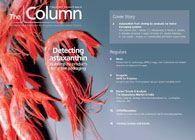Fast disease
Researchers at the Georgia Institute of Technology and the Centres for Disease Control and Prevention have developed a faster method for detecting infections caused by Staphylococcus aureus.
Researchers at the Georgia Institute of Technology and the Centres for Disease Control and Prevention have developed a faster method for detecting infections caused by Staphylococcus aureus.1 They have produced a multiple reaction monitoring liquid chromatography method with tandem mass spectrometric detection via phage amplification detection. The phage amplification detection detects an amplified capsid protein from a specific phage.
To perform their test, the team first injected a known amount of metabolically labelled 15N reference bacteriophage into the S. aureus sample. After a 2 h incubation the sample was subjected to a 3 min trypsin digest and then analysed by high-throughput liquid chromatography with tandem mass spectrometric detection. Quantitation was made possible by comparing peak areas of target peptides from the metabolically labelled 15N bacteriophage peptide internal standard with that of the wild-type 14N peptides that were produced by phage amplification and subsequent digestion when the host bacteria was present. A labelled species differs from an unlabelled one in terms of mass but exhibits almost identical chemical properties.
A 6-point calibration curve was established and standards ranged from 5.0 × 104 colony forming units (CFU) mL−1 to 2.0 × 106 CFU mL−1. The 15N peaked at 1.0 × 109 plaque forming units mL−1.
The study concluded that amplification with 15N joined withLC–MS–MS provides a quick, sensitive and accurate method for detecting S. aureus.
1 John R. Barr et al., Molecular & Cellular Proteomics, 11, M111.012849 (2012).
This story originally appeared in The Column. Click here to view that issue.
HPLC 2025 Preview: Fundamentally Speaking (Part 1)
May 13th 2025Michael Lämmerhofer from the Institute of Pharmaceutical Sciences, University of Tübingen, Germany, spoke to JFK Huber Lecture Award winner of 2024 Torgny Fornstedt, professor in analytical chemistry and leader of the Fundamental Separation Science Group, Karlstad University, Sweden, about his pioneering work in high performance liquid chromatography (HPLC) with a focus on fundamentals and industrial applications.
Biopharmaceutical Characterization in the Age of Artificial Intelligence
May 13th 2025AI-powered tools are enhancing precision, efficiency, and decision-making in biopharmaceutical development. Recently, Jared Auclair and Anurag Rathore explored AI's evolving role in biopharmaceuticals in detail.

.png&w=3840&q=75)

.png&w=3840&q=75)



.png&w=3840&q=75)



.png&w=3840&q=75)










